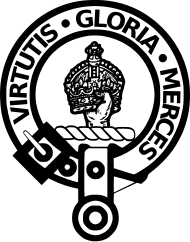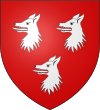Clan Robertson
| Clan Donnachaidh / Clan Robertson | |||
|---|---|---|---|
| Clann Donnchaidh | |||

Crest: Dexter hand holding up an imperial crown Proper
|
|||
| Motto | Virtutis gloria merces (Glory is the reward of valour) | ||
| War cry | Garg 'nuair dhùisgear (Fierce when roused) | ||
| Profile | |||
| Region | Highlands | ||
| District | Struan | ||
| Plant badge | bracken | ||
| Pipe music | Teachd Chlann Dhonnchaidh (Coming of the Robertsons) or Teachd Chlann Donnachaidh (The Clan Donnachie has arrived). | ||
| Chief | |||
 |
|||
| Gilbert Robertson of Struan | |||
| The 24th Chief of Clan Donnachaidh | |||
| Historic seat | Dunalastair Castle | ||
|
|||
|
|||
|
|||
|
|||
Clan Donnachaidh (Scottish Gaelic: Clann Donnchaidh [ˈkʰl̪ˠãũn̪ˠ ˈt̪ɔn̪ˠɔxɪ]), also known as Clan Robertson, is one of the oldest of all Scottish clans.
There are two main theories as to the origins of the Clan Donnachaidh:
The clan's first recognised chief, Donnchadh Reamhar, "Stout Duncan", son of Andrew de Atholia (Latin "Andrew of Atholl"), was a minor land-owner and leader of a kin-group around Dunkeld, Highland Perthshire, and as legend has it, an enthusiastic and faithful supporter of Robert I (king 1306–29 aka Robert the Bruce) during the Wars of Scottish Independence; he is believed to have looked after King Robert after the Battle of Methven in 1306. The clan asserts that Stout Duncan's relatives and followers (not yet known as Robertsons) supported Robert the Bruce at the Battle of Bannockburn in 1314. His descendants became known (in English or Scots) as the Duncansons, or Gaelic Clann Dhònnchaidh, "Children of Duncan". Duncan is believed to have been killed at the Battle of Neville's Cross and was succeeded by Robert, from who the Clan Robertson takes its name. Robert's brother, Patrick, was the ancestor of the Robertsons of Lude who were the principal cadet branch.
In 1394 a clan battle took place between Clann Dhònnchaidh, Clan Lindsay and involving Clan Ogilvy, who were the hereditary sheriffs of Angus, during a cattle raid on Angus. Sir Walter Ogilvy was slain at this battle. Clandonoquhy had rather a reputation as raiders and feuders in late medieval Scotland, though the chiefs seem always to have been loyal to the Bruce and Stewart royal dynasties.
...
Wikipedia
